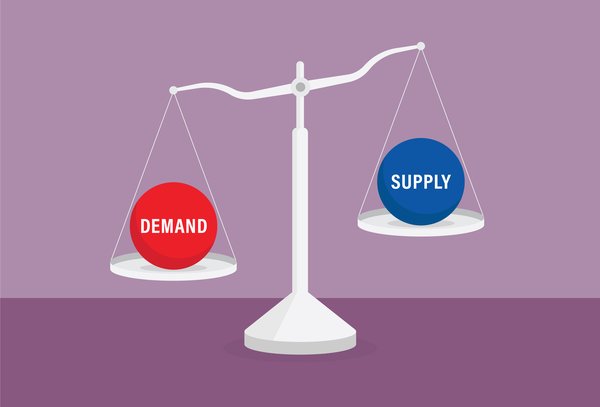Investors have always had many choices, but the market recently gained another option. Traditional choices such as stocks, bonds, real estate, and business ventures have been joined by cryptocurrencies. Let’s see how crypto investments compare so far to the time-honored stock portfolio.

What is crypto vs. stocks about?
Cryptocurrencies have generated massive interest from investors in recent years. Trading volumes and token prices skyrocketed in 2017, backed down for a couple of years, then surged again in 2020. Near the latest peak in November 2021, Bitcoin (CRYPTO:BTC) sported a market cap of $1.2 trillion, while Ethereum (CRYPTO:ETH) tokens were worth a total of $540 billion.
The sudden and dramatic changes in cryptocurrency prices can be exciting. On a good day, the crypto market can look like a successful get-rich-quick scheme, especially when you’re looking at smaller and more volatile altcoins.
Then again, the peaks are usually followed by equally sudden crashes and corrections. Bitcoin and Ethereum have been around for years, but many of those ultra-exciting altcoins have come and gone, leaving investors disappointed.
A number of these qualities also apply to stocks, of course. There are no sure things in any market, and you always have to accept some risk when you’re putting your hard-earned cash to work in any type of investment. But there are some significant differences between investing in cryptocurrencies and investing in stock, and you should know what they are before you make the leap into crypto.
Crypto vs. stocks value
One fundamental difference between stocks and digital coins is that a stock represents ownership of an actual business. Stock investors can base their investment decisions on business results, cash reserves, growth prospects, and more.
The value of a cryptocurrency may eventually have similar qualities if and when people start to use them in real-world transactions and crypto-based applications, but that day is still not here. So far, the market value of a cryptocurrency basically comes down to supply and demand. Can you find someone who is willing to pay a higher price for your crypto coins than you paid when you bought them?
Crypto vs. stocks governance
The stock market has a long history with more than a century’s worth of regulation and legislation baked into every transaction. There are firm rules for how you trade, own, and manage your stock portfolio. You can earn postgraduate degrees and have an entire career in just the taxation aspects of stock-based gains.
The cryptocurrency market doesn’t have any regulatory framework. The U.S. government has several different agencies working up how crypto regulations should look in the long run, but they are just getting started. Should cryptocurrencies be subject to the same rules as the stock market? Are they more akin to fiat currencies such as the U.S. dollar, the euro, and the Japanese yen? Or are they a completely different animal that deserves a whole new rulebook? Maybe every cryptocurrency shouldn’t be treated the same way because different digital coins come with different technology platforms and long-term goals.
The regulatory future for cryptocurrencies is up in the air, and many investors simply will not enter the crypto market until there’s a clear rulebook in place.
Trading crypto vs. stocks
The basic experience of buying cryptocurrencies is not very different from buying a stock. You open an account with a crypto brokerage, transfer some money to that account, pick a cryptocurrency, and place an order with the brokerage. After a short break, you’ll have some cryptocurrency tokens (or a fraction of a token) in your crypto wallet.
The gears may turn very differently behind the scenes, but the crypto-buying procedure should feel familiar if you’ve ever bought a stock. There are some differences, though:
- Crypto brokers are likely to charge trading fees for each transaction -- a practice that most stock brokers ended in 2018 and 2019. For example, the popular Coinbase (NASDAQ:COIN) platform charges a transaction fee of 0.6% on crypto purchases of less than $10,000.
- A stock transaction can be performed very quickly, to the point where algorithmic trading systems can close a deal in a few microseconds. Crypto trades are slower because each new transaction must be approved and verified by the digital currency’s blockchain network -- a process that typically takes about 15 seconds for Ethereum trades and several minutes on the Bitcoin network.
- Unless you insist on a printed stock certificate, your stock broker will act as the custodian of your stock-based holdings. That’s not always the case for cryptocurrencies, where some investors insist on removing their digital coins from the centrally managed brokerage platform in favor of a cold wallet in their own possession.
Related investing topics
Crypto advantages vs. stocks
Crypto coins can run extremely hot, skyrocketing at the drop of a hat. Since their valuation generally isn’t held back by financial results (or the lack thereof) or other value-investor concerns, the sky is the limit.
Many crypto investors hope to be among the first to put money into the next big thing before it takes off. The chances of hitting that winning lottery ticket may be small, but it could certainly happen. Other people prefer cryptocurrencies because of their decentralized nature, enhanced privacy features, high-powered automation options when the currency offers smart contracts, and other advanced options that no ordinary stock or currency can offer.
Crypto disadvantages vs. stocks
The lack of proper regulation adds an uncomfortable amount of risk to the crypto market. Until Congress figures out how to manage a newfangled class of digital assets, many investors will stay away for good reason. In particular, institutional investors won’t capitalize the fledgling market until they know how the government will tax the gains and how regulators will address fraud in cryptocurrency trading systems.
The slow transactions can also be an issue for some traders. Soaring crypto prices can come crashing down just as quickly.
How can you be sure that both your cryptocurrencies and your crypto brokerage are safe from hackers? And what if you download your crypto holdings to a safe local wallet -- and then forget the password? These things have happened in the past, and they may very well happen again.
Investing in crypto vs. stocks
Simply put, you are likely to lose much more sleep worrying about the security of your cryptocurrencies than you ever did worrying about your stock portfolio.
If you are an experienced stock owner, you may want to add some crypto to your portfolio, but you should do that in small nibbles and make sure that you’re learning everything you can about the crypto market before taking that step.
If you don’t have any investing experience at all, you shouldn’t jump straight into the deep end of the pool. You’ll be better off learning the fundamentals of investing and long-term thinking in the stock market.
You can dip your toes into the crypto opportunity without even opening a crypto brokerage account. Many well-respected companies are exploring the cryptocurrency phenomenon from a variety of unique angles, with the added fall-back security of a serious business operation. Investing in these companies is probably the best place to start thinking about crypto investments for most people.
What does the future look like for crypto and stocks?
The cryptocurrency sector’s quirks, challenges, and opportunities will change over time. Regulations are on their way, but it’s too early to tell what the final regulatory structure will look like. Meanwhile, the stock market continues to evolve more slowly, having dealt with the bulk of its growing pains many decades ago.
So until further notice, stocks are inherently safer than cryptocurrencies, and the stock market’s calmer waters can still generate life-changing wealth over time. You should keep your crypto exposure small for now, keeping in mind the speculative nature of these exciting but largely unproven opportunities.





























































































































